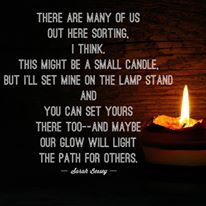No matter where I go, I constantly look for people I know.
While in Nashville with friends, we decided on boot scootin’ barbecue for lunch and partway through the meal an announcement came over the loudspeaker, “welcome to the Wingfield Society family reunion!” I stood up from my table and said, “these are my people! I’ll be right back.” I went to the balcony, introduced myself as a Wingfield and eventually conversed with my great Aunt.
This, among other incidences (like at the Portland airport) reinforce my small-town conditioned belief that I can always find someone I know. I’m constantly looking, even in the silliest places – like on vacation or in a mall in a different city. When I talk to new people, I seven-degrees us, trying to find mutual people from our paths.

Image by Christy Clements Beach, used with permission.
Knowing this about me, then, you’ll understand that upon opening the pages of Sarah Bessey’s new book, Out of Sorts, my heart felt at home. I had found My People. Though I’ve met Sarah only once, in an awe-struck teenager sort of way, I am now connected to over 200 people across several continents on this journey to sort through our faith as we know it. We’re highlighting favorite passages and “yes, me too!”-ing it into the wee hours on Facebook.
If you’ve been following along on this bloggy ride for a little while, you know I write about my faith often, and even more frequently, what it means for my life. As I’ve changed vocations and locations, I have noticed significant shifts in what I believe to be true, right and good. Most significantly, I read the Bible differently than I did 10 years ago. This is a welcome change, one that I hope you embrace in your own life. As Sarah says, if our theology doesn’t shift or change over our lifetimes, I have to wonder if we were paying attention.
This book has been a welcome, even timely oasis, one that welcomes sorting through what we’ve accumulated throughout our life experiences, discarding what isn’t needed and even re-purposing that which is but doesn’t seem to work in the same way. Often times we sort in solitude. We lie in wait with our questions, wondering if our uncertainties make us crazy or, even, not a Christian. The temptation is to hide silently in our suffering as the things which previously held up our faith shatter on the ground around us.
Instead, we need to move toward the rubble. Sarah writes, “the fear to engage with our evolution only worsens the pain.” The I-cannot-question-that Holy Grail is exactly the thing that needs to be picked up and moved around or we’ll never know what it can withstand. Jesus likened his words to the strong, steady foundation of a house, not the delicate etchings of a glass window. Those kind of things decorate, but you cannot build a house – or a faith – with them.
I’ve said before, three of the most powerful words we can use with someone is, “yes, me too.” It helps chase away the crazy – or, at least, normalizes it. There is just something to finding a friendly face, even a familiar one, as you trudge through challenges.
You can be 430 miles away from home, but when you hear over a loudspeaker that others with your heritage, your namesake, have arrived in the same place at the very same time, be reminded: you’re not lost. Just wandering.

Lovely!